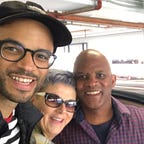Heroes vs. ideas
Supporting the work or the person behind it
One of my lifetime heroes is Abdul Sattar Edhi (Edhi sb), who lived a life that was indescribably selfless. Because of this, Edhi sb has become the most beloved and respected hero and role model in Pakistan, a country where we are quite skeptical of heroes / role models (e.g., Malala Yousafzai, Dr. Abdus Salam, etc.) and find many reasons to downsize, dismiss or directly disqualify them.
And actually, this is quite rational: people will always disappoint, fall short, fail to live up. Because the problem with people is that people are people. We’re imperfect, resulting in a complex paradox of life, described simply by William Finger (co-creator of Batman): Either you die a hero or live long enough to see yourself become a villain.
To me, this not only seems like a paradox but also a deep tragedy. That we claim there are no role models or heroes to look up to, but in actuality we are placing our hope in the wrong place: in a person rather than an idea or in the work itself.
There’s an incredible line from V is for Vendetta which beautifully describes this tragedy (and how to prevent it):
Remember the idea, not the man, because a man can fail. He can be caught, he can be killed and forgotten, but 400 years later, an idea can still change the world.
What does it mean / look like to put our faith and hope in the idea, rather than in the hero? There are many answers, but perhaps a good first step is to avoid putting our role models on a pedestal (from which they will inevitably fall). This seems obvious, but some of the implications are more subtle: for example, in the social enterprise space, this would mean avoiding the tendency to consider entrepreneurs as some type of savior, hero or creator (a tendency which is sometimes called hereopreneurship).
Rather than heroising people, perhaps the second step is to focus on the work itself. To respect it, learn from it, get inspired from it, and to especially help extend or build upon it. For example, I often hear people ask if Edhi Foundation will be able to continue now that Edhi sb has passed away, and I’ve come to believe that this depends heavily on us: did we believe in the person or in their work/idea. Because the work hasn’t changed. Edhi sb has been preparing his successor (his son) for 20+ years. But if we believed only in Edhi sb and not his work, then we will stop giving and Edhi Foundation’s fate is already written.
There are very few Edhi sbs in this world, very few (perhaps none) who won’t ultimately fail to live up to our expectations of them. So if we do continue to put our hope and faith in people, then we will almost always be disappointed.
Rather than elevating our heroes so high up that this inevitable fall will kill them (and perhaps us), we should follow the method of Edhi sb:
We are not in a position to change anything. Not by any method other than the accomplishment of our work. Concentrate on that, the rest is not for us to interfere with.
